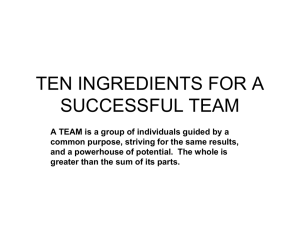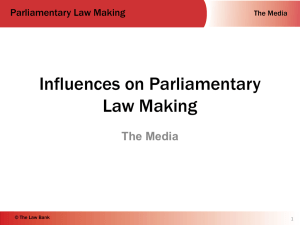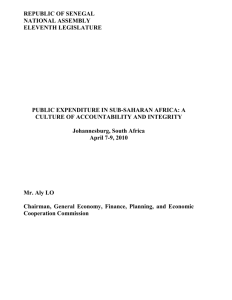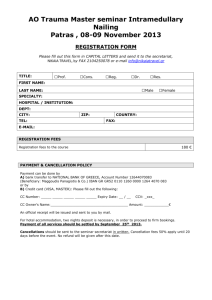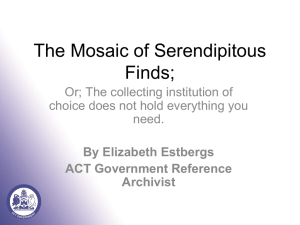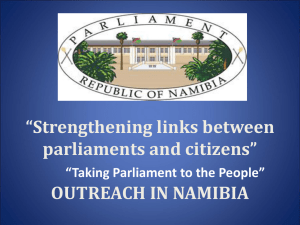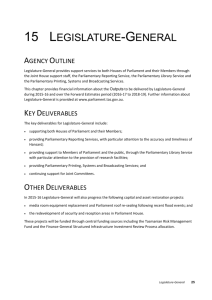ORIENTATION PROGRAM FOR THE NEW MEMBERS OF
advertisement
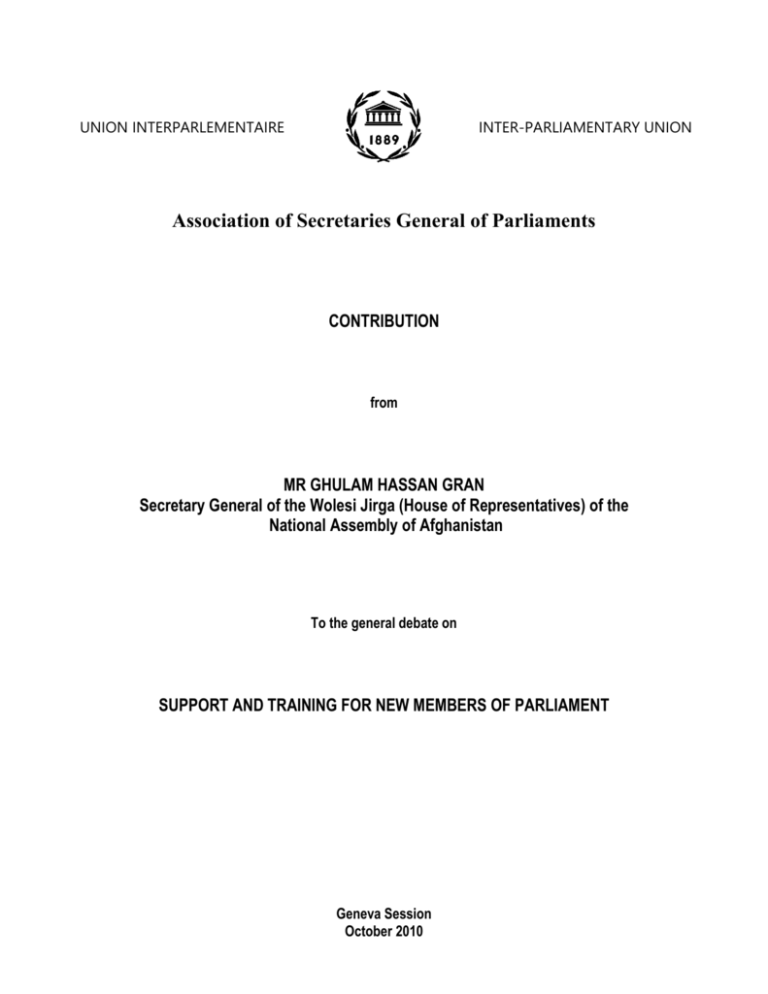
UNION INTERPARLEMENTAIRE INTER-PARLIAMENTARY UNION Association of Secretaries General of Parliaments CONTRIBUTION from MR GHULAM HASSAN GRAN Secretary General of the Wolesi Jirga (House of Representatives) of the National Assembly of Afghanistan To the general debate on SUPPORT AND TRAINING FOR NEW MEMBERS OF PARLIAMENT Geneva Session October 2010 ORIENTATION PROGRAM FOR THE NEW MEMBERS OF THE WOLESI JIRGA (HOUSE OF REPRESENTATIVES) NATIONAL ASSEMBLY OF AFGHANISTAN 1. Introduction The main purpose for conducting orientation programs is to acquaint newly elected and re-elected members with their new roles as people’s representatives. During the program, members will be given orientation about the functions of Parliament and their roles in processing legislation, conducting oversight, and their responsibilities as representatives of the people. Orientation program offers the opportunity to make new members aware of parliamentary processes and the internal procedures they will adhere to. In broad terms, orientation programs serve the following: Inform Members of Parliament about the Role of Parliament as one of the three pillars of the State. Provide members with the essential knowledge of parliamentary practices and procedures. This will facilitate and allow for effective participation in legislative, oversight and representation processes. Orientation programs allow members to become acquainted with recent developments in parliamentary institutional development. Through sharing experiences, members are informed of developing trends in parliamentary reforms. Orientation programs provide an opportunity for members to be exposed and informed of the various services that parliaments afford to them to enable effective discharge of constitutional mandates. The General Secretariat of the Wolesi Jirga plays a key role in the Orientation of new and returning members. This includes the planning and actual conduct of the orientation program. The Secretariat determines appropriate content and subjects to be discussed during the orientation program. Information packages relating to the Practices and Procedures of the House are prepared. members are also supplied with the internal rules of the Administration of Parliament, including the administrative services availed for their convenience. 2 The planning process for the Orientation is particularly important as the General Secretariat has to ensure that all logistical arrangements are put in place in time for a successful orientation program. This is important as the orientation program, for new members particularly is their first engagement with Parliament. The orientation program is especially useful for the new members, as most of the members will not be familiar with either the roles and functions of parliament, or the internal rules and procedures for conducting parliamentary business. Orientation programs are especially useful in a country like Afghanistan, where election to the National Assembly is not based on political parties. Members elected to the National Assembly therefore do not always represent a given party or organized position but most times their individual viewpoints. Party discipline which characterizes the conduct of members in parliamentary systems is not always present in Afghanistan. The Orientation program serves as an opportunity to equip members with skills on how to put forward their messages in a manner that is respectful of parliamentary democracy. Further, Orientation programs are important in that they recognize that members do not all have the same level of knowledge and education. They provide an opportunity for those members with limited information about parliamentary procedures to obtain more information which will serve them better in conducting their work. Since the National Assembly of Afghanistan is a young parliament, having only been re-established five years ago after more than 30 years of conflict, orientation programs are important in ensuring the growth and development of the capacity of the members of the institution. 2. Main Imperatives for Orientation programs in Afghanistan Most MP’s of the Wolesi Jirga have low qualifications; The absence of political parties does not allow for disciplined messaging and collective positions, it is therefore important to prepare individual members for their parliamentary processes as there is no party to prepare its members; 30 years of conflict necessitate that democratic values have to be taught to members; 3 There is need to develop from the onset the mindset within members that Parliament is a body for democratic and peaceful resolution of conflicts. Most members formerly were involved in the internal conflicts of the country; Parliamentary processes are continuously changing and there is a need to provide members with recent and up to date information on Parliamentary reforms; The Orientation program serves as a useful opportunity for members to begin to interact among themselves and also to familiarize themselves with the General Secretariat and how the Secretariat functions. Content of the Orientation Program 16th Term of the National Assembly of Afghanistan 2010 Methodology of the Constitution; The Principle of the Separation of Powers- Checks and Balances; Parliamentary Privileges and Immunities (Constitutional); Legislation in the Wolesi Jirga (House of Representatives); Representation, Development and Relations with Electoral Constituencies; Agendas, Urgent Request, Quorum, Discussions for Voting; Rules of Procedure; The legislative Process of Government Bills; International Organizations and Parliamentary Diplomacy; Procedure for Official Tours and Visits of the MP’s; The Budget Approval Process and Parliamentary Oversight of the State Budget Process; 4 Media Relations, Publications and Public Awareness; Introduction to processing of International treaties; Registration System, administration, Results and Acts of a session; Parliamentary Code of Conduct; Parliamentary Structures (Admin Boards, Committees, Political Groups and Chairs of Committees); Security Regime of the National Assembly; Independence and Impartiality of the General Secretariat; Information, Communication and Technology Systems; 5 Year Parliamentary Strategy of the Wolesi Jirga (House of Representatives); Formation of Political Groups; Democracy Development and Civil Society; Tour to the Premises of the National Assembly; Briefing on arrangements at the Joint Session of the National Assembly, in terms of Article 104 of the Constitution, by the President of the Islamic Republic of Afghanistan; Evaluation, Conclusion. The Abovementioned will be conducted by: Parliamentary Staff; Local Afghan Experts; International Experts; CSO Representatives. Expectations and Results After the completion of the orientation program, members of the Wolesi Jirga will be acquainted with the following: 5 Legal Position as the Member of the House; Legal Obligations and Responsibilities as a Representatives of the People; Duties and Oversight Authorities according to the Provisions of the Constitution; Duties and Authorities as member of the House during the Legislation according to the Provisions of the Constitution; Duties and Authorities as member of the House during the Budget Process according to the Provisions of the Constitution; Role of the General Secretariat; Independency of the General Secretariat; Structure of the General Secretariat; Security Rules of the House; Constitution of Afghanistan; Rules of Procedure of the Wolesi Jirga and all other internal Rules of the House; Code of Conduct with Counterpart MP’s, Admin Board and the General Secretariat; and other clients including the Member of the Executive Body Privileges, Obligations and Immunities of a member of the National Assembly; Rights and Obligations of Afghanistan According to the International Treaties; Challenges: If the staff of the General Secretariat of the House would like to present a subject to the MP’s, this could create huge sensitivities and the MP’s consider that as if the government has asked them to do so, in this case we ask the University Professors to assist us in such situations in order to ignore the misunderstandings. 6
